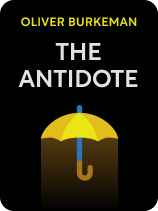

This article is an excerpt from the Shortform book guide to "The Antidote" by Oliver Burkeman. Shortform has the world's best summaries and analyses of books you should be reading.
Like this article? Sign up for a free trial here.
What’s the difference between your experiences and your perceptions of them? What’s a simple way to mitigate disappointment?
It might seem counterintuitive but, if you want to find true happiness, you must accept your emotions—all of them. That’s the view of Oliver Burkeman, who provides three methods for embracing the good, the bad, and the ugly.
Read more to understand Burkeman’s argument and techniques that can put you on the road to happiness.
Accept Your Emotions
Burkeman explains that happiness doesn’t come from experiencing only positive emotions but from accepting your emotions and thoughts, even the seemingly negative ones. This approach helps you avoid the unproductive cycles of forced positivity and self-blame.
(Shortform note: Ironically, embracing negative thoughts and feelings can help you approach life more positively. According to research, negative thoughts and feelings allow you to recognize what experiences are most satisfying or joyful to you. If you felt good all the time, you wouldn’t be able to distinguish between positive and negative experiences or know what type of experiences to pursue more of.)
Burkeman suggests three methods to help you accept your thoughts and feelings.
#1: Practice Mindful Observation
Observe your thoughts and emotions impartially, without judgment or attachment. Noticing your thoughts without becoming entangled in them cultivates acceptance. For example, if the thought “I am not good enough” surfaces, simply acknowledge it and let the thought drift away.
(Shortform note: According to mental health experts, mindfulness can also enhance well-being by alleviating symptoms of stress-related health issues such as high blood pressure or tension headaches. In Mindfulness in Plain English, Bhante Gunaratana recommends establishing a schedule to turn your mindfulness practice into a habit. Begin by setting aside 10 to 20 minutes each morning or evening, lengthening your time as you get more comfortable with the process.)
#2: Examine Your Judgments
Burkeman says you should acknowledge that experiences aren’t inherently positive or negative; it’s your judgments that shape your emotional response. This realization fosters acceptance by helping you perceive experiences more neutrally. For example, seeing a traffic jam as an occurrence rather than an inconvenience eliminates the negative connotation and reduces frustration.
(Shortform note: This approach aligns with Cognitive Behavioral Therapy (CBT), which focuses on questioning the rationality of uncomfortable thoughts about a situation. This process helps you examine and challenge your perceptions so that you can find more objective ways to think about and judge your experiences. The more you question the validity of your judgments, the less likely you are to accept them as facts and allow them to rule your emotions.)
#3: Shift to Preference-Based Thinking
Burkeman recommends reframing wants and wishes from being absolute needs to preferences to reduce the stress and disappointment you feel when things don’t go as planned. For example, reframe “I must always have a clean home” to “I prefer a clean home but it’s OK if it’s not always organized” to alleviate distress over occasional disorder.
(Shortform note: Here’s a practical way to embrace preference-based thinking: Write down everything you want to do in a day and group them into categories like career, relationships, and self-care. Then, work through the list and strike anything that’s not aligned with your current needs. For example, you might want to be the mom leading multiple organizations at your child’s school but need downtime with your family in the evenings. Once you have a handle on what your needs are, plan your schedule around them. This exercise keeps your time focused on what matters most to you and highlights which parts of your life are lower-priority wants.)

———End of Preview———
Like what you just read? Read the rest of the world's best book summary and analysis of Oliver Burkeman's "The Antidote" at Shortform.
Here's what you'll find in our full The Antidote summary:
- Why forcing yourself to think positive thoughts doesn't make you happy
- How typical self-help advice can sometimes make you feel worse
- How to experience contentment even amid seemingly negative experiences






